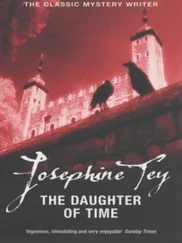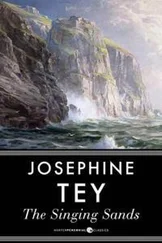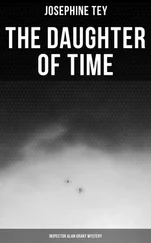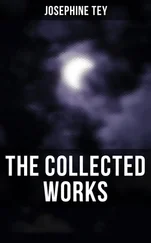‘And Kenrick thought that he had discovered the site.’
‘He was sure of it. Poor boy, I hope that I was not short-tempered with him.’
‘You think that he was wrong, then?’
‘Mr Grant, the legend of Wabar exists from the Red Sea clear across Arabia to the Persian Gulf, and for almost every mile of that distance there is a different alleged site for the city.’
‘And you don’t believe that perhaps someone might stumble on it by accident?’
‘By accident?’
‘Kenrick was a flyer. It is possible that he saw the place when blown off his course, isn’t it?’
‘Had he talked to his friend about it then?’
‘No. He had talked to no one that I know of. That was my own deduction. What is to hinder the discovery being made that way?’
‘Nothing, of course, nothing; if the place exists at all. I have said: it is a legend almost universal throughout the world. But where stories of ruins have been tracked to their source the “ruins” have always proved to be something else. Natural rock formation, mirage, cloud-formation even. I think what poor Kenrick saw was the crater of a meteor. I have seen the place myself. A predecessor of mine discovered it when he was looking for Wabar. It is unbelievably like a place made with hands. The thrown-up earth makes pinnacles and jagged ruinous-looking heights. I think I have a photograph somewhere. You might like to see it: it is a unique affair.’ He got up and slid back a panel in the bare painted-wood wall, disclosing shelves of books all the way from floor to ceiling. ‘It is, perhaps mercifully, not every day a meteor of any size falls on the earth.’
He picked a photograph album from one of the lower shelves, and came back across the room looking for the place in the collection. And Grant was seized without warning by a strange sense of familiarity; a feeling of having met Lloyd somewhere before.
He looked at the photograph that Lloyd laid before him. It was certainly an uncanny thing. An almost mocking pastiche of human achievement. But his mind was busy with that odd moment of recognition.
Was it just that he had seen Heron Lloyd’s photograph somewhere? But if it had been that, if he had merely seen Lloyd’s face as adjunct to some description of his exploits, then the sense of recognition would have come when he had first walked into the room and seen him. It was not so much a recognition as a sense of having known Lloyd somewhere else. In some other surroundings.
‘You see?’ Lloyd was saying. ‘Even on the ground, one has to go close up to it before one can be sure that the thing is not a collection of human dwellings. How much more misleading it must be from the air.’
‘Yes,’ agreed Grant, and did not believe it. For one very good reason. From the air the crater would have been plainly visible. From the air it would have looked exactly what it was: a circular hollow surrounded by the thrown-up earth. But he was not going to say that to Lloyd. Let Lloyd talk. He was growing very interested in Lloyd.
‘That lies very close to the Kenrick boy’s route across the desert, as described by himself, and I think that that is what he saw.’
‘Did he pin-point the place, do you know?’
‘I don’t know. I didn’t ask him. But I should think he would. He struck me as being a very efficient and intelligent young man.’
‘You didn’t ask him for details?’
‘If someone told you, Mr Grant, that he had discovered a holly tree growing in the middle of Piccadilly immediately opposite the In and Out, would you be interested? Or would you just think that you must be patient with him? I know the Empty Quarter as well as you know Piccadilly.’
‘Yes, of course. Then it was not you who saw him off at the station?’
‘Mr Grant, I never see anyone off. A combination of masochism and sadism that I have always deplored. Off where, by the way?’
‘To Scoone.’
‘To the Highlands? I understood that he was longing for some gaiety. Why was he going to the Highlands?’
‘We don’t know. That is one of the things we are most anxious to find out. He said nothing to you that might provide a clue?’
‘No. He did suggest finding other backing. I mean, when I had proved a broken reed. Perhaps he had found a backer, or hoped to find a backer, who lives up there. I can’t think of any obvious one off-hand. There is Kinsey-Hewitt, of course. He has Scottish connections. But I think he is in Arabia at the moment.’
Well, at least Lloyd had provided the first reasonable explanation of the flying visit north with an overnight case. To talk to a possible backer. He had found a backer at the last moment, when he was almost due to meet Tad Cullen in Paris, and had dashed north to see him. That fitted beautifully. They were getting on. But why as Charles Martin?
As if the thought had been transferred, Lloyd said: ‘By the way, if the Kenrick boy was travelling as Charles Martin, how has he been identified as Kenrick?’
‘I travelled on that train to Scoone. I saw him when he was dead, and grew interested in some verse he had been scribbling.’
‘Scribbling? On what?’
‘On a blank bit of an evening paper,’ Grant said, wondering why it should matter what Kenrick had been writing on.
‘Oh.’
‘I was on holiday, with nothing else to do, so I amused myself with the clues provided.’
‘You played detective.’
‘Yes.’
‘What is your profession, Mr Grant?’
‘I’m a Civil Servant.’
‘Ah. I was going to suggest the Army.’ He smiled a little and picked up Grant’s glass to refill it. ‘The more rarefied ranks, of course.’
‘G.S.O. 1?’
‘No. An attaché, I think. Or Intelligence.’
‘I have done a spot of Intelligence during my Army career.’
‘So that is where you developed your taste for it. May I say, your flair.’
‘Thank you.’
‘It was no ordinary talent that identified Charles Martin as Bill Kenrick. Or had he Kenrick belongings that made the identification easy?’
‘No. He was buried as Charles Martin.’
Lloyd paused as he was setting the filled glass down and said: ‘That is so typical of that careless Scottish way of dealing with sudden death. They are always very smug about their lack of inquests. Myself, I think Scotland must be an ideal place in which to get away with murder. If ever I plan one, I shall lure my victim north of the Border.’
‘There was an inquest, as it happens. The accident took place shortly after the train left Euston.’
‘Oh.’ Lloyd thought this over and then said: ‘Don’t you think that this should be reported to the police? I mean the fact that they have buried someone under a wrong name.’
Grant was about to say: ‘The only proof we have that the dead Charles Martin was Kenrick is my identification of a not very good snapshot.’ But something stopped him. Instead he said: ‘We should like first to know why he had Charles Martin’s papers.’
‘Ah, yes. I see. That of course is a sufficiently questionable matter. One doesn’t acquire a man’s papers without some—preliminaries. Does anyone know who Charles Martin is—or was?’
‘Yes. The police were satisfied on that score. There was no mystery.’
‘The only mystery is how Kenrick came by his papers. I see why you are reluctant to go to official sources. What about this man who saw him off? At Euston. Could he have been Charles Martin?’
‘He could, I suppose.’
‘The papers may merely have been lent. Kenrick somehow did not strike me as a—shall we say, nefarious type.’
‘No. On all the evidence, he wasn’t.’
‘It’s a very curious business altogether. This accident that you say he had: I suppose there is no doubt that it was an accident? No suggestion of a quarrel?’
Читать дальше












